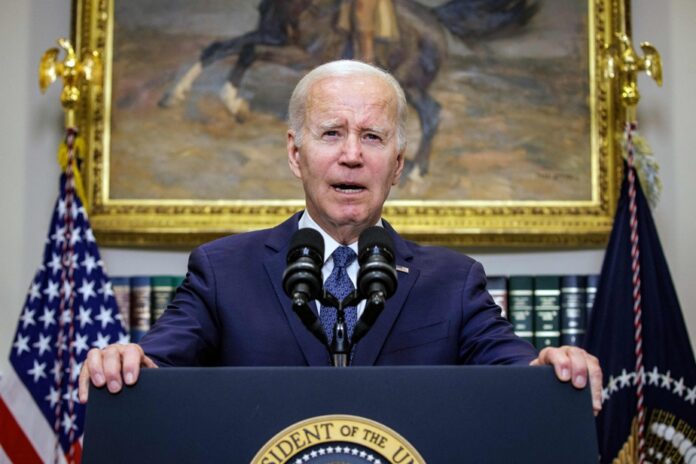(Washington) The debt agreement intended to avoid a default in the United States is ready to be submitted to the United States Congress, President Joe Biden announced on Sunday, urging parliamentarians to adopt it.
“Let’s continue to move forward by delivering on our obligations and building the strongest economy in the history of the world,” Biden said during a brief media appearance at the White House. urging “both houses to adopt this agreement”.
After marathon negotiations, President Biden and the Republican leader announced on Saturday evening an agreement in principle on the raising of the American debt ceiling to ward off the threat of bankruptcy from June 5.
But the agreement must receive the approval of a divided Congress and is already the subject of a sling of elected progressives and conservatives some speaking of a “capitulation”.
“He may not satisfy everyone, but it’s a step in the right direction that no one expected,” the Republican leader defended on Fox News on Sunday, welcoming in particular a downward “new trajectory” given to public spending.
He predicted that a “majority” of elected Republicans would vote for it.
The House of Representatives, where Republicans have a fragile majority of 222 to 213, will vote on Wednesday. Next will come the Senate, narrowly controlled by the Democrats (51-49).
Senate Democrat Leader Charles Schumer, who controls the parliamentary agenda, has already warned to expect “Friday and Saturday” votes next day, two days before the deadline for a payment default.
Such a scenario would be unprecedented in the history of the United States.
President Biden welcomed this “compromise” on Saturday evening, which is “good news, because it avoids what would have been a catastrophic [payment] default”. Kevin McCarthy called him “completely worthy of the American people”.
The text of the agreement has not yet been disclosed, but in broad outline it raises for two years, so until after the 2024 presidential election, the public debt ceiling of the United States.
This is currently set at $31.4 trillion.
Non-defence spending will remain virtually unchanged next year and increase only nominally in 2025.
It also provides for a $10 billion cut in funds allocated to tax services to modernize and strengthen controls, as well as the recovery of funds allocated to the fight against COVID-19 that have not yet been spent.
The compromise also includes new conditions imposed to benefit from certain social aids, including food stamps.
MM. Biden and McCarthy are playing their political credit in this case.
The first, who is a candidate for re-election, must avoid a bankruptcy with potentially catastrophic consequences, while the second seeks to establish his authority after being poorly elected to the perch at the start of the year.
President Biden had long refused to come to the negotiating table, accusing the opposition of holding the US economy “hostage”, but eventually relented.
Still, a circumstantial alliance between elected progressives and conservatives could derail everything.
Conservative Republicans have already announced their opposition to the text, such as Rep. Dan Bishop who vilified McCarthy for getting “almost nothing.”
Without raising the debt, the first world power risks, according to the American Treasury, being in default of payment from June 5, unable to honor its financial commitments: salaries of civil servants, pensions or reimbursements to its creditors.
Like almost all major economies, the United States lives on credit.
But unlike other developed countries, America regularly comes up against a legal constraint: the debt ceiling, the maximum amount of indebtedness of the United States, which must be formally raised by Congress.
This has long been routine legislative procedure. The Republicans have made it an instrument of political pressure.















